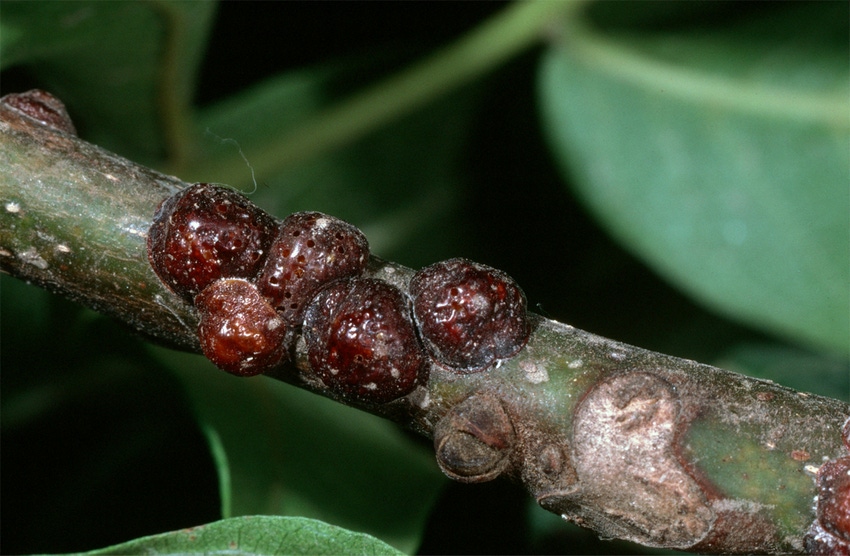
Frosted scale, a pest normally associated with walnut production, has found that pistachio trees are also a suitable host.
This year, frosted scale, Parthenolecanium pruinosum, a soft-scale pest, was found in pistachio blocks in many California growing areas and some at high numbers. One theory about the uptick in frosted scale numbers is that treatments in pistachios to control small plant bugs or leaffooted bugs may have wiped out populations of native parasitic wasps that normally keep the soft scales in check.
Another possible cause for the outbreaks, said Integral Ag pest control adviser Nate Laux, is that growers have cut back on dormant sprays in recent years so scale populations began to build. In some cases, he says frosted scale populations appeared to blow up several weeks after spray treatments for Gill’s mealybug.
In blocks with high frosted scale numbers, Laux said in-season treatments had mixed results. High frosted scale numbers were first spotted in late May to early June, he said, and persisted through the summer in some cases.
This pest, like most soft scales, reproduces and colonizes on green stems - inhibiting photosynthesis and reducing terminal growth and vigor. Frosted scale also secretes large amounts of honeydew which covers nuts and favors the growth of sooty mold - increasing the chances for sunburn damage.
Frosted scale overwinters in the nymph stage on twigs and small branches. It starts growing in the spring taking on a convex shape and a waxy cover with a frosted appearance. The female pest lays eggs in late spring filling the space under their cover and then dying after egg production.
The white, waxy cover from frosted scale weathers away; leaving oval shaped dark brown covers where nymphs emerge from late May through June. Nymphs feed on the undersides of leaves during the summer, molting in the fall and moving back to twigs.
A similar scale, European fruit lecanium, has the same life cycle as frosted scale, and Laux said the pest flared in pistachios six to seven years ago, much like this year’s frosted scale outbreak.
According to University of California (UC) Integrated Pest Management guidelines, parasites have historically played an important role in controlling soft scales on tree nut crops. If parasite populations are low due to weather or pesticide applications targeting other pests then chemical control may be needed.
Parasitic wasps that attack soft scales include Coccophagus, Encyrtus and Metaphycus spp. The Metaphycus wasps produce multiple generations, compared to the one generation for scales, and they parasitize all stages of frosted scale. When this happens, the nymphs are nearly black in color and have convex covers. Non-parasitized nymphs are flat and opaque.
Growers who have had frosted scale infestations should monitor for live and parasitized scale on dormant shoots. A light to moderate population would be an average of one-to-five live scale per inch of fruiting wood. A heavy population would be an average of 10-or-more live scale per inch.
Emergent holes in the body of the dead mature scale are a sign of parasitization. A high level of this may keep numbers down, and possibly eliminate the need for insecticide applications.
UC guidelines advise considering the age, vigor, and percent of split nuts when making treatment decisions. Growers can place double-sided sticky tape near adult scales in the early spring to monitor for crawler emergence and then time the treatments.
Dormant treatments for frosted scale should be applied in mid-February before its waxy coating develops. Biological control and oil applications can be used in organic production.
About the Author(s)
You May Also Like




